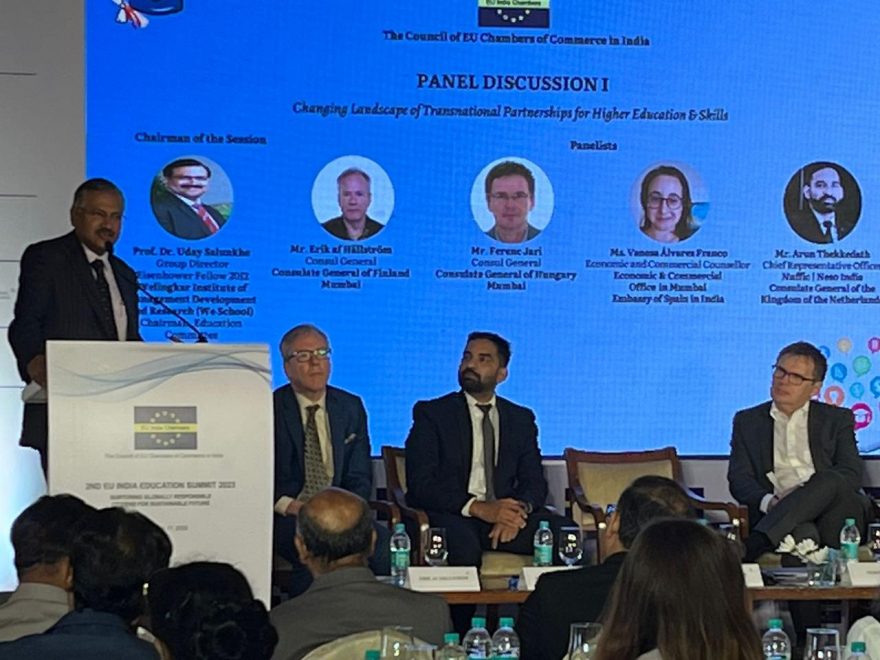Chairman of the Session: Prof. Dr. Uday Salunkhe, Group Director, Eisenhower Fellow 2012, Welingkar Institute of Management Development and Research (We School) & Chairman, Education Committee, EU Chambers.
Speakers:
- Mr. Erik af Hällström, Consul General, Consulate General of Finland, Mumbai
- Ms. Anna Lekvall, ConsulGeneral, Consulate Generalof Sweden, Mumbai
- Mr. Ferenc Jari, Consul General, Consulate General of Hungary, Mumbai
- Ms. VanesaÁlvarez Franco, Economic and Commercial Counsellor, Economic & Commercial Office in Mumbai, Embassy of Spain in India
- Mr. Arun Thekkedath, Chief Representative Officer, Nuffic | Neso India Consulate General of the Kingdom of the Netherlands.
The panellists threw light on building an inclusive educational ecosystem for global challenges through EU-India stakeholders requires collaboration and a shared vision for the future.






There are several key strategies that can be employed to achieve this goal:
Foster partnerships between universities: Universities in the EU and India can collaborate to share resources and expertise, and to develop joint research projects that address global challenges. This will help to build a network of institutions that are committed to an inclusive educational ecosystem. Promote student exchange programs: Student exchange programs can help to promote cross-cultural understanding and build bridges between the EU and India. By participating in exchange programs, students can gain valuable international experience and develop new skills.
Develop joint degree programs: Joint degree programs can provide students with a unique educational experience that combines the strengths of institutions in the EU and India. This can help to prepare students for the challenges of the global economy and foster greater cooperation between the two regions.
Embrace technology: Technology can be used to facilitate collaboration and communication between stakeholders in the EU and India. Online learning platforms and virtual classrooms can be used to connect students and teachers across borders, and to provide access to educational resources and materials. Address cultural differences: Cultural differences can present challenges to building an inclusive educational ecosystem. It is important to address these differences through training and education programs that promote cultural understanding and sensitivity. By implementing these strategies, stakeholders in the EU and India can work together to build an inclusive educational ecosystem that prepares students to tackle global challenges and fosters greater collaboration between the two regions. Erasmus+ has had a significant impact on the EU-India educational relationship by providing opportunities for students and staff from both regions to study and work together. Here are some ways in which Erasmus+ has affected this relationship: Student mobility: Erasmus+ has provided opportunities for Indian students to study in the EU and for EU students to study in India. This has helped to promote cross-cultural understanding and to build stronger ties between the two regions.
Staff mobility: Erasmus+ has also provided opportunities for staff from higher education institutions in the EU and India to work together on joint projects and to share best practices. This has helped to facilitate the exchange of knowledge and expertise between the two regions. Joint degree programs: Erasmus+ has supported the development of joint degree programs between higher
education institutions in the EU and India. These programs provide students with a unique educational experience that combines the strengths of institutions in both regions. Research collaboration: Erasmus+ has supported research collaboration between higher education institutions in the EU and India. This has helped to promote joint research projects that address global challenges and to share research findings and expertise.
Capacity building: Erasmus+ has supported capacity building activities in higher education institutions in India, such as the development of new courses and curricula, and the improvement of teaching and learning methodologies. This has helped to strengthen the overall quality of higher education in India. Overall, Erasmus+ has played an important role in promoting collaboration and building stronger ties between the EU and India in the field of higher education. It has provided opportunities for students, staff, and institutions to work together and to share knowledge and expertise, and has contributed to the development of a more inclusive and interconnected educational ecosystem.
About ISBR: ISBR Business School, Bangalore-based, Top Class B School for PGDM or MBA, Consistently ranked as best B School in India, AICTE-CII Platinum Category, with multiple specializations

